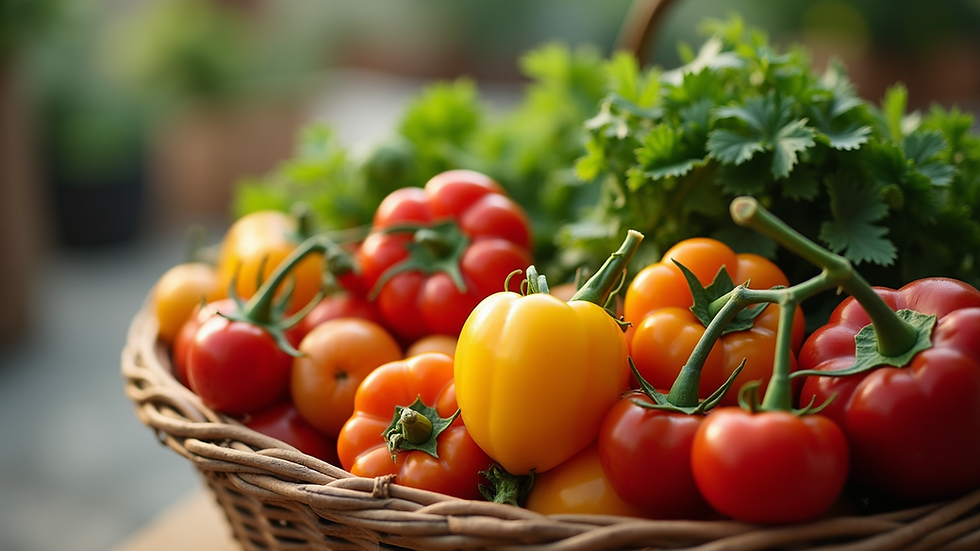Why Organic Products Are Essential for a Healthier Life
- superiorpro
- Apr 7, 2025
- 4 min read
In today's fast-paced world, the choices we make about what we consume have a profound effect on our health and the environment. Among these choices, the decision to switch to organic products has gained significant traction. Many people are discovering the benefits of organic foods, natural skincare, and eco-friendly household items, leading to questions about why organic products are so essential for a healthier life. This blog will explore the numerous benefits of organic products and their impact on our well-being.
The Benefits of Organic Products
When we talk about organic products, we refer to items cultivated without the use of synthetic chemicals, pesticides, or genetically modified organisms (GMOs). This leads to several advantages for consumers. Studies have shown that organic produce typically contains higher levels of antioxidants, vitamins, and minerals compared to conventionally grown counterparts.

Moreover, organic farming practices focus on soil health, crop rotation, and biodiversity. This not only enhances the nutritional value of the food but also decreases the risk of chemicals entering our bodies. For example, a study published in the British Journal of Nutrition found that organic crops contain up to 60% more antioxidants than conventional crops.
A Safer Alternative: Reducing Chemical Exposure
Another significant benefit of choosing organic products is minimizing exposure to harmful chemicals. Conventional farming relies heavily on pesticides and fertilizers that can linger on produce, leading to pesticide residues in our diets. These chemicals have been linked to various health issues, including endocrine disruption and cancer.
By opting for organic, you can ensure that your food is free from these harmful substances. It’s not just about personal health; it is also about protecting the environment and supporting sustainable farming practices. Choosing brands like evans organics guarantees you are part of a movement that emphasizes safety and well-being for all.

Supporting Local Economies and Transparent Practices
Buying organic products often means supporting local farmers who employ ethical practices. Many organic brands source their ingredients from local farms, providing economic support to communities and reducing the carbon footprint associated with long-distance transport.
When you purchase organic products, you tend to favor companies that prioritize transparency in their supply chains. This awareness fosters more ethical consumerism and brings attention to the need for sustainable practices. Organic farming is also more labor-intensive, which means it creates more job opportunities within the community.
Nutritional Superiority
Organic products stand out not just for their purity but also for their nutritional profile. A study published in the Journal of Agricultural and Food Chemistry revealed that organic dairy products have higher levels of omega-3 fatty acids compared to conventional dairy products. This is crucial for heart health and brain function.
The question arises: how can you incorporate more organic products into your diet? Start small by substituting your staple items like milk, eggs, and grains with organic options. Gradually, you can extend this to fruits and vegetables, ensuring that you are reaping the benefits of higher nutrient levels.
Environmental Impact
One cannot discuss organic products without considering their impact on the environment. Organic farming reduces pollution and conserves water by avoiding synthetic fertilizers and pesticides. Additionally, organic farms typically promote biodiversity by maintaining a balance of ecosystems. This is essential for sustainability as it protects vital resources like soil health and water quality.
By supporting organic farming, you contribute to the conservation of flowers, bees, and other pollinators that are crucial for food production. The United Nations has reported that biodiversity is declining at an unprecedented rate, and we all can play a role in reversing this trend through our purchasing decisions.

Choosing Organic: How to Start
Switching to organic products does not need to be overwhelming. Here are some straightforward tips to help you start integrating organic options into your daily life:
Prioritize: Start with the Dirty Dozen – The Environmental Working Group publishes an annual list of produce with the highest pesticide residues. Focus on buying organic versions of these items first.
Local Markets – Visit farmers' markets or local co-ops to find fresh organic produce and support local farmers directly.
Eco-friendly Products – When choosing personal care and household items, look for certifications that indicate organic standards. This can help ensure that you are minimizing your chemical exposure across all aspects of your life.
Educate Yourself – Familiarize yourself with labels and certifications. Not all products labeled as “natural” are organic, so it’s essential to do your research.
Budgeting – Organic products can sometimes be more expensive. Look for sales, buy in bulk, or join a Community Supported Agriculture (CSA) program for better prices.
By implementing these practical tips, you can begin to enjoy the numerous benefits of organic products and lead a healthier life.
Why Choose Organic for Your Family
If you have a family, you may wonder how to ensure that your loved ones are making healthy choices. Organic products offer peace of mind. When children consume organic fruits and vegetables, you will know they are not ingesting harmful chemicals that could negatively impact their growth and development.
Additionally, organic dairy and meat products come from animals that are raised in humane conditions without the use of antibiotics or growth hormones. This is especially important for families who are conscious of the quality of the food they consume.
In summary, making the choice to go organic is not just a trend; it is a commitment to health, sustainability, and ethical practices. By choosing organic products, you are contributing to a healthier you and a healthier planet.
The Future of Organic Products
As consumer awareness grows, the demand for organic products is expected to increase. The organic market has witnessed impressive growth over the last decade and is projected to continue its upward trajectory. Big food manufacturers are also recognizing the importance of organic offering, creating more options for consumers.
This opens the door for innovative farming practices and cooking methods that align with an organic lifestyle. Health professionals are likely to advocate for organic diets more strongly, resulting in wider acceptance across all demographics.
By embracing organic products, we align our lifestyles with the values of health, sustainability, and ethical consumption. It’s not just a purchase; it's a lifestyle choice that benefits us all.








Comments